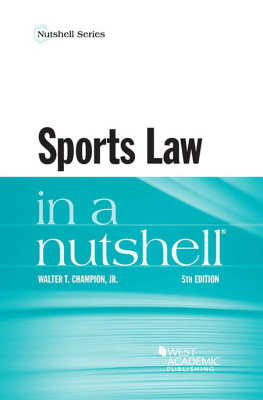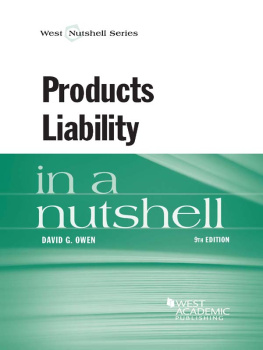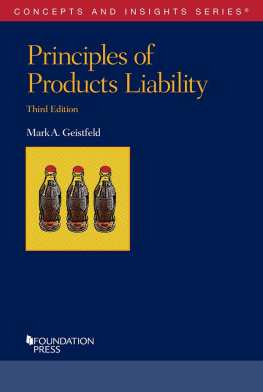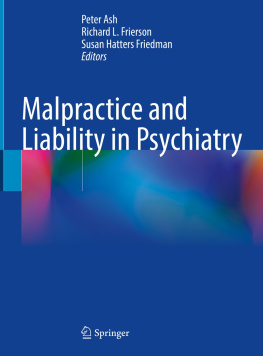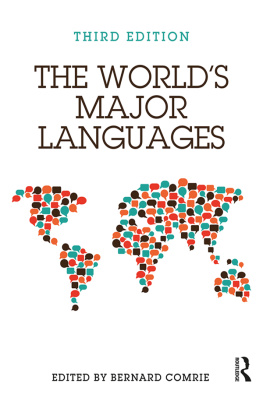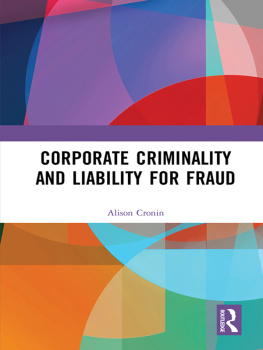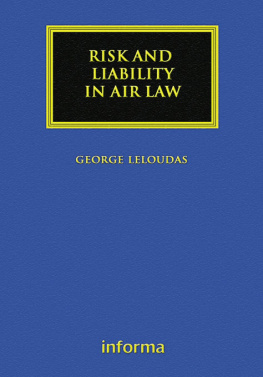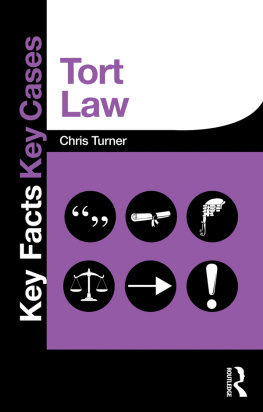WEST ACADEMIC PUBLISHINGS LAW SCHOOL ADVISORY BOARD
JESSE H. CHOPER
Professor of Law and Dean Emeritus,
University of California, Berkeley
JOSHUA DRESSLER
Distinguished University Professor, Frank R. Strong Chair in Law
Michael E. Moritz College of Law, The Ohio State University
YALE KAMISAR
Professor of Law Emeritus, University of San Diego
Professor of Law Emeritus, University of Michigan
MARY KAY KANE
Professor of Law, Chancellor and Dean Emeritus,
University of California, Hastings College of the Law
LARRY D. KRAMER
President, William and Flora Hewlett Foundation
JONATHAN R. MACEY
Professor of Law, Yale Law School
ARTHUR R. MILLER
University Professor, New York University
Formerly Bruce Bromley Professor of Law, Harvard University
GRANT S. NELSON
Professor of Law, Pepperdine University
Professor of Law Emeritus, University of California, Los Angeles
A. BENJAMIN SPENCER
Earle K. Shawe Professor of Law,
University of Virginia School of Law
JAMES J. WHITE
Robert A. Sullivan Professor of Law Emeritus,
University of Michigan
SPORTS LAW
IN A NUTSHELL
FIFTH EDITION
WALTER T. CHAMPION, JR.
George Foreman Professor of
Sports and Entertainment Law,
Texas Southern University
School of Law

The publisher is not engaged in rendering legal or other professional advice, and this publication is not a substitute for the advice of an attorney. If you require legal or other expert advice, you should seek the services of a competent attorney or other professional.
Nutshell Series, In a Nutshell and the Nutshell Logo are trademarks registered in the U.S. Patent and Trademark Office.
1993 WEST PUBLISHING CO.
WEST, a Thomson business, 2000, 2005
2009 Thomson Reuters
2017 LEG, Inc. d/b/a West Academic
444 Cedar Street, Suite 700
St. Paul, MN 55101
1-877-888-1330
West, West Academic Publishing, and West Academic are trademarks of West Publishing Corporation, used under license.
Printed in the United States of America
ISBN: 978-1-63460-580-9
To Ed OBannon,
basketball player and visionary
PREFACE
This Nutshell will explain all elements of Sports Law in an organized, reasonably coherent manner. Sports Law flows through our lives in many different formats and impacts on many different people: from agents to lawyers to athletic directors to fans. This book is a review of sports law; it can also be used as a course book, a student outline, a primer for would be professionals (whether agent, athletic director, athlete, or coach), or just a nice way to mull away an afternoon.
This is my fifth edition, and the need for a unified text on sports law is greater than ever. In some ways, I find myself in the position of ombudsman to the genre. The field has changed dramatically in the last seven years including moral dilemmas in drug testing, athletic discipline, gambling, player morality, owner scandals, league corruption, and litigation against the NCAA and FIFA. Hopefully, this edition will help resolve some of the conundrums. The maxim of French philosopher/historian Jacques Barzun, with respect to sports in general, remains true: Whoever wants to know the hearts and minds of America had better learn baseball.
Walter Champion
Houston, Texas
December 2016
ACKNOWLEDGMENTS
A good book needs good contributors. To begin with, I was lucky enough to have coerced four exemplary sports professionals to write introductions for the first four editions, namely, Steve Patterson, Nick C. Nichols, Oliver Luck, and George Foreman, boxer, preacher, entrepreneur, and philanthropist, by way of his letter to Michael Vicks sentencing judge. This edition is introduced by Peter Schaffer, an outstanding sports agent.
I was also lucky to secure contributions, advice, revisions, and consultations from several outstanding legal scholars, namely: I. Nelson Rose (gaming law), McKen Carrington (financial considerations), and Danyahel Norris (intellectual property).
A good book needs good people behind it, and that we have in abundance. Special thanks goes to my students: Mike Warner, Tre Meredith, Jayne Griffin, Mary Helen Rigney, and Aljosa Anthony Dvizac. Many great professionals have assisted me throughout the years in popularizing the Good News of Sports Law. They are, in no particular order: Ricky Anderson, Oliver Luck, Steve Underwood, Bill Frizzell from Tyler, Texas, Kary Wilson from Sweetwater, Texas, Steve Patterson, Nick C. Nichols, the Hon. Harold Dutton, Randy Hendricks, Gregory Scrap Simmons, and Peter Schaffer.
Id like to also thank Dr. Reginal D. Harris, a 2nd-year law student, for his scrutinizing eye in updating the index of this book.
I especially want to thank my faculty research librarian, Tara Long, Esq., for research and fact checking.
Another sincere acknowledgement goes to George Foreman, who has the foresight to use his position to improve the field of Sports Law.
Walter Champion
Houston, Texas
December 2016
INTRODUCTION TO FIFTH EDITION BY: PETER SCHAFFER
What comes to mind when you hear sports law? Most think of agents and their accompanying fame and prestige. Sports law brings to mind watching Super Bowl games from the sidelines, access to superstars, and more than occasionally the heated phone call. However, sports law is much more involved than any Hollywood depiction. Sports law builds lawyers. The reality is that while people are fascinated by sports law because it involves athletics, competition, the almighty dollar, and national heroes, this book explores sports law as a compendium of just about every legal discipline from contracts, to torts, to civil rights, to constitutional law, to anti-trust, to contracts, to the First Amendment. Champions book delves into every discipline of law as easily as Tom Brady tosses touchdown passes in the snow of Foxboro. While people become interested in sports law because they think they will be seeing Grestskys and Sanders, they eventually learn all areas of law, with sports fact patterns involved.
Whether you are employed by an amateur organization, the NCAA, a sports team, an athletic apparel company, or a sport agency, you will find yourself becoming a general counsel and find yourself studying and learning areas of the law you never imagined you would come across. Sports law gives lawyers the variety of experience that few areas of the law do.
Professor Walter Champion is a true sports law expert. His many years as a sports law professor can be easily seen in his writing. His ability to teach is second only to his expertise in sports law. Since it takes aspects from many disciplines of law, sports law is a balance of exciting, complicated and mundane subjects. Champion knows how to make the less interesting aspects of sports law into compelling ones. He also knows how to use sports to make other areas of law interesting. He has a way of making the complex into easily understood terms for all to learn. When discussing the NCAA, he effectively simplifies the labor laws it violates. In todays era of technology and 140 character statements, Champion demonstrates his expertise by being succinct yet thorough, without being verbose or redundant.
His students, who are perhaps groaning at thought of constitutional law, begin to enjoy the subject after they study how it applies to ones rights to participate in sports, and the due process that applies to them. Students return to take as many of his classes as possible, and sports law-loving readers return to read as many of his books as possible.

